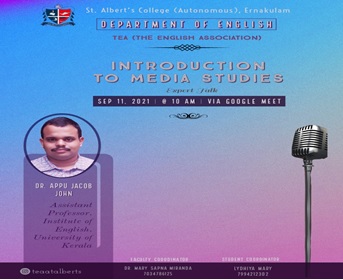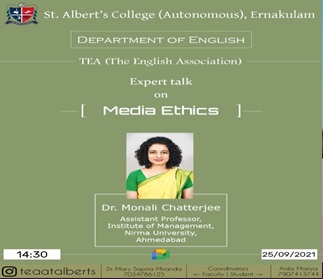Certificate Programmes
Launch of Certificate Programme in Media Studies
As part of the launch of the Certificate Programme in Media Studies, expert lectures were conducted for the benefit of the students. The introductory talk on ‘Introduction to Media Studies’ was delivered by Dr. Appu Jacob John, Assistant Professor, Institute of English, University of Kerala. Another lecture on the important aspect of Ethics in Media was given by Dr. Monali Chatterjee from the Institute of Management Studies, Nirma University, Ahmedabad. The course coordinator is Dr. Mary Sapna Peter Miranda.


The Albertian English Language Programme
Course Coordinator: Dr. Sapna Miranda
Credit: 2
Contact Hours: 30
Mode of Assessment: Oral & Written
Course Overview:
This course is designed for students learning English at different levels to acquire and develop their English language knowledge and skills. The course is structured within the Common European Framework of Reference and is divided into Basic, Intermediate, and Advanced levels.
The aim of the syllabus is to prepare students to use English for their college studies and, subsequently, for their professional needs in real-life and work environments. This preparatory course will also provide students with opportunities to speak on general topics, communicate in a business environment, and understand texts on general subjects.
The English Language Programme incorporates three key components:
- General English
- Spoken English
- Business English
The course aims to develop a wide range of skills:
- Communication skills, particularly spoken skills covering various communication scenarios.
- Language development, involving grammar and extensive vocabulary learning.
- Writing skills, with a focus on literacy, short essays, memoranda, and notes.
- Reading, involving the study of instructional business-related texts of topical relevance.
- Listening, including comprehension of gist and detailed information.
Course Objectives:
The main objectives of the syllabus are:
- To develop students’ speaking skills to enable them to use general, social, and professional language.
- To provide material for students to learn English pronunciation, reading, writing, and the fundamentals of grammar and vocabulary.
- To develop students’ reading skills to enable them to skim adapted texts for main ideas, scan for specific information, and interpret texts for inferences.
- To develop students’ writing skills to enable them to respond to input, apply information to tasks, and summarize information in essays (140–160 words).
- To develop students’ listening skills to enable them to understand and apply specific information from input.
- To enhance students’ overall capacity to use English in their professional and academic environments.
Methods of Assessment:
Assessment is based on coursework, which includes:
- Oral interactions (including pair work)
- Individual and group oral presentations
- Written tests and tasks of varying lengths (memoranda, notes)
- Essays
- Listening/viewing exercises
- Summarizing simple reading passages
- Translation of simple texts
Classroom participation, progress, and motivation will contribute to the overall assessment. A final exam will include an oral topic, listening comprehension, and an extract for translation into English.
Main Reading:
This syllabus will be fulfilled using textbooks, training materials, and supplementary resources adapted for different proficiency levels. Up-to-date materials will help students develop necessary skills in reading, writing, listening, and speaking.
Course Outline
The content of the English syllabus is based on preliminary testing, with students grouped into three streams: Basic, Intermediate, and Advanced. This approach helps lower-level students achieve required competence while allowing advanced students to refine their English proficiency.
- General English
Students learn pronunciation, reading, and writing. They acquire knowledge of fundamental grammatical structures (e.g., sentence types, tenses, voice, parts of speech, word order) and functions (e.g., expressing possibility, obligation, necessity, preferences, making assumptions, giving permission, making offers/suggestions). They build vocabulary for role-plays, discussions, and listening exercises (monologues and dialogues), focusing on gist, main points, and specific details.
- Spoken English
Students practice conversing on various topics (e.g., people, jobs, travel, festivals, disasters, eating habits, sports, environment, education, entertainment, transport, crime). Listening comprehension and spoken skills are enhanced through reading assignments and oral tasks. Students learn strategies for different reading purposes (identifying main points, locating details, understanding text structure).
- Business English
Students learn business vocabulary and workplace communication skills (greetings, requests, apologies, interviews, group discussions). The course aims to:
- Develop comprehension of business vocabulary through role-plays.
- Enhance listening skills in business contexts.
- Enable students to express business concepts in their own words while summarizing.
Competence is measured by performance in key business areas (meetings, negotiations, telephoning, social English) and the ability to write memos and notes.
Skills Development
Students develop skills in:
Listening:
- General comprehension (gist, detailed information, evaluating importance).
- Lectures (identifying topics, main themes, and key information).
Speaking:
- Basic spoken skills (introductions, daily routines, opinions, general topics).
- Seminar skills (agreeing/disagreeing, clarifying, questioning, concluding).
- Presentation skills (introductions, signposting, highlighting key points, summaries).
Reading:
Skimming, scanning, detailed reading, guessing unknown words, understanding text organization, recognizing arguments, distinguishing main ideas from supporting details, summarizing, and note-taking.
Writing:
Students produce texts of various types: formal/informal letters, argumentative essays, narratives, memoranda, and notes. Focus areas include:
- Essay structure (organization, paragraphing, coherence, cohesion).
- Functions (generalization, definitions, comparisons, cause-effect, processes).
- Style (passive constructions, avoiding verbosity).
- Punctuation.
Competence is measured by the ability to:
- Communicate with peers and lecturers.
- Read and understand academic language.
- Write assignments in an appropriate academic style.
- Comprehend spoken language.
Topics and Activities (include but are not limited to):
- Myself
- My family
- Likes and dislikes
- Opinions on various topics
- Meeting people and making contacts
- City life and transportation
- Home life
- Travel and customs
- Hotels and shopping
- Dining out
- Phone calls
- Office environments
- Business discussions
- Interview skills
- Memos, letters, reports, proposals
- Job applications, cover letters, resumes
- Presentation and group discussion skills



